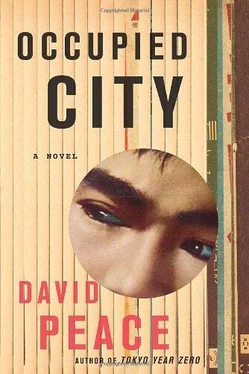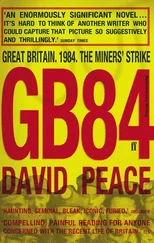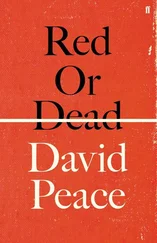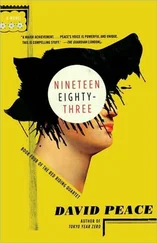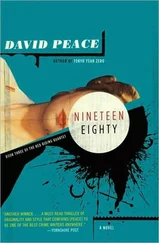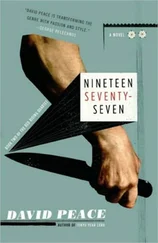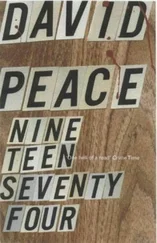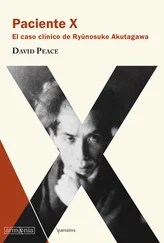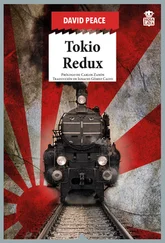‘Pardon?’ I ask. ‘What did you say?’
‘Nothing,’ she says and now she gets out of the car in front of the station, out of the car and into the crowds, the crowds that have come in their thousands, in their thousands to see this man, this man who the crowds believe murdered her co-workers and her friends –
This man who tried to murder her, to kill her –
Now she grabs my hand suddenly and she holds my hand tightly as I push and I shove through the crowds, the crowds in their thousands who are pushing and shoving to catch a glimpse, a glimpse of this man, this man called Hirasawa Sadamichi –
This man who tried to murder her –
But the train is late, the train delayed, and the crowd is growing and growing, pushing and shoving, and now the train has arrived, the train is here, and the crowd are pushing and shoving, harder and harder, and I am holding her in front of me, my hands on her waist, tighter and tighter, pushing her forward, raising her up, higher and higher, hoping and praying she’ll see him, hoping and praying she’ll see him and say that this is the man, this is the man who murdered her co-workers –
This man who –
‘I can’t see,’ she whispers. ‘I can’t see him …’
IN THE FICTIONAL CITY, in the dancehall on the Ginza, with its sticky suits and sweaty faces, its jungle rhythms and deafening shoes, in this Fictional City, I am shouting, shouting over the drums and the feet, ‘I thought you were my man-on-the-inside, my man-in-the-know, but I’m the last-man-to-know, I’ve been scooped …’
He shrugs. He says, ‘Everyone’s in the dark. Not just me, not just you. They kept the rest of us chasing suspects with military backgrounds, with medical backgrounds, telling us to forget about the name-cards, giving it to Robbery, moving Robbery out of HQ …’
‘But they told us not to write about the military men, the medical men; told us to keep it out of our papers,’ I say. ‘And look where that’s got us? Duped and scooped …’
He laughs, ‘You think you guys, your paper, are the only ones who get censored? Wake up! This is an Occupied Country. They can do what they want. It’s a set-up …’
‘He’s innocent?’
He sighs, ‘Course he is. But they’re desperate. They followed the name-cards and this is where it’s led them. But there are seventeen name-cards which have not been traced, that are unaccounted for. This guy is just one of seventeen and the moment the survivors set eyes on him, that’ll be that…’
‘That’ll be what?’
He laughs again, ‘The end of their case. The survivors won’t be able to identify him and then they’ll have to let him go …’
‘You think so?’
He winks at me now and says, ‘I know so. All of us do, all of us except Ikki and his name-card team. It’s all circumstantial…’
‘But off-the-record, they’re telling us they’re 100 per cent certain. That’s why they’ve gone so public with his arrest…’
‘And, of course, you believe everything you hear,’ he laughs. ‘Everything they tell you. Well, you just watch …’
IN THE FICTIONAL CITY, I write a story, half-a-story:
Well-Known Artist Held As Poison Holdup Suspect
The latest Teikoku Bank ‘mass murder’ suspect arrested in Otaru, Hokkaido, arrived at Heno Station yesterday morning under the custody of seven policemen .
The suspect, Hirasawa Sadamichi, 57, spent most of the trip from Hokkaido hiding under a blanket as crowds gathered at every major railway station along the route to get a glimpse of the man suspected of the ‘poison holdup’ which resulted in the death of 12 bank employees .
Metropolitan police authorities, however, warned that it was too early to jump to premature conclusions and said that Hirasawa’s connection with the case would most likely be cleared up within 48 hours .
Hirasawa is a well-known water-colour artist and left for Hokkaido soon after the Teigin mass murder .
Police said there was only circumstantial evidence against him. He was slated to be interviewed by the survivors of the mass murder .
Bearing a close resemblance to the murderer, Hirasawa had been under suspicion before but was released for lack of evidence. His testimony concerning the name-card he admitted receiving from Dr Matsui Shigeru differed from that given by the latter .
Mrs Hirasawa Masako, wife of the suspect, yesterday denied as ‘ridiculous’ the reports that her husband was the long-sought mass murderer. While the general description may fit that of the wanted man, she said that it was unbelievable that he should commit such a diabolic crime .
In the Fictional City, this city of millions, millions will read my newspaper, millions will half-read my half-a-story, and then some of these people will form mobs and these mobs will attack the house of Mrs Hirasawa and her daughters, with sticks and with stones, Mrs Hirasawa and her daughters in hiding now, now and for ever in the Fictional City.
IN THE FICTIONAL CITY, in a restaurant far from Shiinamachi, far from the scene of the crime, I look up from the table, the glass jar of toothpicks, the white bottle of soy sauce, and I ask her, ‘So what happened? Did you see Hirasawa? Was Hirasawa the man who …’
‘They took me to the Sakuradamon Police Station,’ she says. ‘And they took me into an interrogation room, and this man, this Hirasawa Sadamichi looked up from the table at me and I stared back at him, looked him in his face, hoping and praying that I had seen his face before, that this was the man who had murdered my colleagues and my friends, the man who had tried to kill me …’
‘And was it?’ I ask her. ‘Was it him?’
‘When the killer began to distribute the poison,’ she whispers, ‘I looked him in his face. I will never forget that face.’
‘I know,’ I say.
‘I would know it anywhere.’
‘I know,’ I say again. ‘And was his face that face?’
‘No,’ she says, shaking her head. ‘It was not the face I saw that day. The face I saw that day was round. Very round, like an egg. This man Hirasawa has a square face. Very square, like a box. He’s also too old. He’s not that man. Hirasawa is not the killer.’
I look back down at the table, the glass jar of toothpicks, the white bottle of soy sauce, and I say, ‘I’m sorry.’
‘Me too,’ she says. ‘Me too.’
IN THE FICTIONAL CITY, a telephone rings again, a voice speaks, along the wires again, down the cables, with a time and with a place –
Down an alley, in a room, another room of shadows, another room of stares, a man I know is sitting with a man I don’t –
The man I know gestures at the man I don’t and he says, ‘This gentleman here works for the Free People’s Rights League and this gentleman has something for you, don’t you?’
The man hands me an envelope.
I open it. I start to read –
The man I know says, ‘You don’t need to read it all now. It’s for you. You can keep it. But, as you can see, the document details the many ways in which the arrest of Hirasawa violated his civil rights under our new constitution …’
I put the document back in its envelope. I take out my wallet. I take out my cash. The man I know points to the man I don’t –
He smiles and he says, ‘Give it to him. Not me.’
The man I don’t know, this man from the Free People’s Rights League, counts my cash. The man puts it in his jacket pocket. This man smiles now and says, ‘Thank you.’
In this Fictional City, this city of inclement weather, this city of demonstrations, the man I know says, ‘But don’t forget, everything’s a set-up …’
IN THE FICTIONAL CITY, I write a new story for a new day:
Читать дальше
